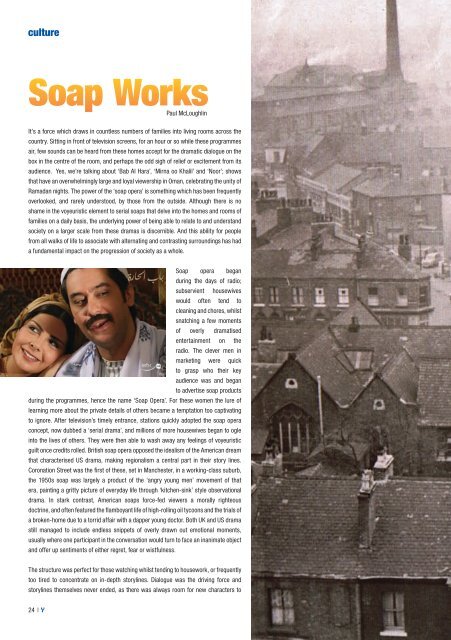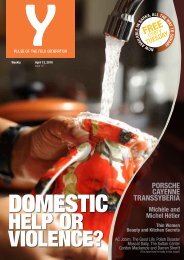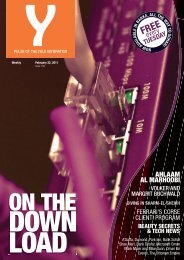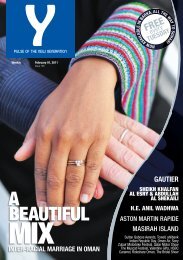Y Tabloid - Issue 88 - September 15, 2009 - Y-oman.com
Y Tabloid - Issue 88 - September 15, 2009 - Y-oman.com
Y Tabloid - Issue 88 - September 15, 2009 - Y-oman.com
- No tags were found...
Create successful ePaper yourself
Turn your PDF publications into a flip-book with our unique Google optimized e-Paper software.
Soap WorksPaul McLoughlinIt’s a force which draws in countless numbers of families into living rooms across thecountry. Sitting in front of television screens, for an hour or so while these programmesair, few sounds can be heard from these homes accept for the dramatic dialogue on thebox in the centre of the room, and perhaps the odd sigh of relief or excitement from itsaudience. Yes, we’re talking about ‘Bab Al Hara’, ‘Mirna oo Khalil’ and ‘Noor’; showsthat have an overwhelmingly large and loyal viewership in Oman, celebrating the unity ofRamadan nights. The power of the ‘soap opera’ is something which has been frequentlyoverlooked, and rarely understood, by those from the outside. Although there is noshame in the voyeuristic element to serial soaps that delve into the homes and rooms offamilies on a daily basis, the underlying power of being able to relate to and understandsociety on a larger scale from these dramas is discernible. And this ability for peoplefrom all walks of life to associate with alternating and contrasting surroundings has hada fundamental impact on the progression of society as a whole.Soap opera beganduring the days of radio;subservient housewiveswould often tend tocleaning and chores, whilstsnatching a few momentsof overly dramatisedentertainment on theradio. The clever men inmarketing were quickto grasp who their keyaudience was and beganto advertise soap productsduring the programmes, hence the name ‘Soap Opera’. For these women the lure oflearning more about the private details of others became a temptation too captivatingto ignore. After television’s timely entrance, stations quickly adopted the soap operaconcept, now dubbed a ‘serial drama’, and millions of more housewives began to ogleinto the lives of others. They were then able to wash away any feelings of voyeuristicguilt once credits rolled. British soap opera opposed the idealism of the American dreamthat characterised US drama, making regionalism a central part in their story lines.Coronation Street was the first of these, set in Manchester, in a working-class suburb,the 1950s soap was largely a product of the ‘angry young men’ movement of thatera, painting a gritty picture of everyday life through ‘kitchen-sink’ style observationaldrama. In stark contrast, American soaps force-fed viewers a morally righteousdoctrine, and often featured the flamboyant life of high-rolling oil tycoons and the trials ofa broken-home due to a torrid affair with a dapper young doctor. Both UK and US dramastill managed to include endless snippets of overly drawn out emotional moments,usually where one participant in the conversation would turn to face an inanimate objectand offer up sentiments of either regret, fear or wistfulness.The structure was perfect for those watching whilst tending to housework, or frequentlytoo tired to concentrate on in-depth storylines. Dialogue was the driving force andstorylines themselves never ended, as there was always room for new characters to24
















